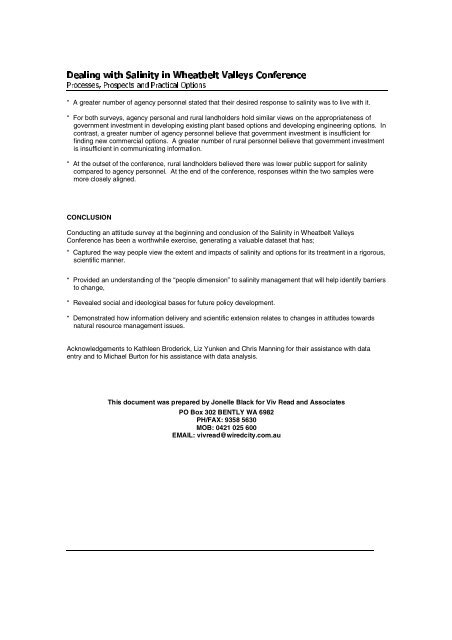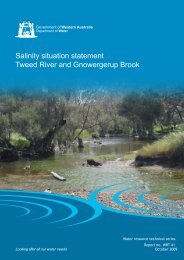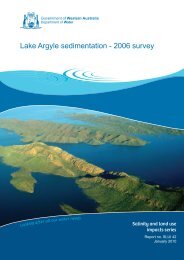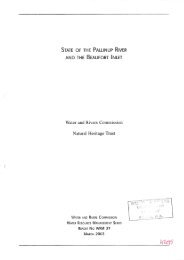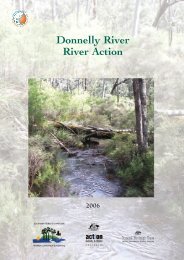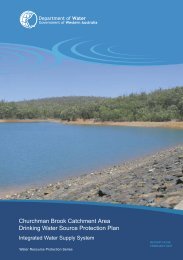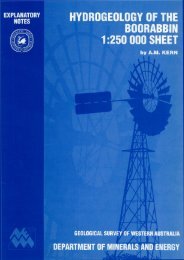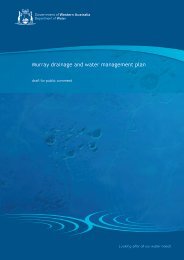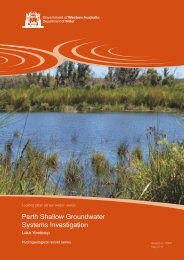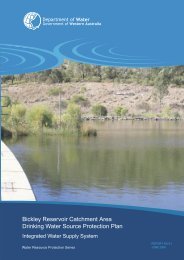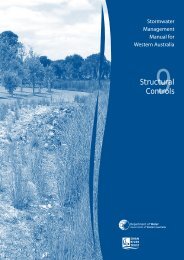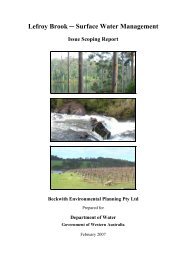Dealing with salinity in Wheatbelt Valleys - Department of Water
Dealing with salinity in Wheatbelt Valleys - Department of Water
Dealing with salinity in Wheatbelt Valleys - Department of Water
You also want an ePaper? Increase the reach of your titles
YUMPU automatically turns print PDFs into web optimized ePapers that Google loves.
<strong>with</strong> Sal<strong>in</strong>ity <strong>in</strong> <strong>Wheatbelt</strong> <strong>Valleys</strong> Conference<br />
<strong>Deal<strong>in</strong>g</strong><br />
Prospects and Practical Options<br />
Processes,<br />
* A greater number <strong>of</strong> agency personnel stated that their desired response to <strong>sal<strong>in</strong>ity</strong> was to live <strong>with</strong> it.<br />
* For both surveys, agency personal and rural landholders hold similar views on the appropriateness <strong>of</strong><br />
government <strong>in</strong>vestment <strong>in</strong> develop<strong>in</strong>g exist<strong>in</strong>g plant based options and develop<strong>in</strong>g eng<strong>in</strong>eer<strong>in</strong>g options. In<br />
contrast, a greater number <strong>of</strong> agency personnel believe that government <strong>in</strong>vestment is <strong>in</strong>sufficient for<br />
f<strong>in</strong>d<strong>in</strong>g new commercial options. A greater number <strong>of</strong> rural personnel believe that government <strong>in</strong>vestment<br />
is <strong>in</strong>sufficient <strong>in</strong> communicat<strong>in</strong>g <strong>in</strong>formation.<br />
* At the outset <strong>of</strong> the conference, rural landholders believed there was lower public support for <strong>sal<strong>in</strong>ity</strong><br />
compared to agency personnel. At the end <strong>of</strong> the conference, responses <strong>with</strong><strong>in</strong> the two samples were<br />
more closely aligned.<br />
CONCLUSION<br />
Conduct<strong>in</strong>g an attitude survey at the beg<strong>in</strong>n<strong>in</strong>g and conclusion <strong>of</strong> the Sal<strong>in</strong>ity <strong>in</strong> <strong>Wheatbelt</strong> <strong>Valleys</strong><br />
Conference has been a worthwhile exercise, generat<strong>in</strong>g a valuable dataset that has;<br />
* Captured the way people view the extent and impacts <strong>of</strong> <strong>sal<strong>in</strong>ity</strong> and options for its treatment <strong>in</strong> a rigorous,<br />
scientific manner.<br />
* Provided an understand<strong>in</strong>g <strong>of</strong> the “people dimension” to <strong>sal<strong>in</strong>ity</strong> management that will help identify barriers<br />
to change,<br />
* Revealed social and ideological bases for future policy development.<br />
* Demonstrated how <strong>in</strong>formation delivery and scientific extension relates to changes <strong>in</strong> attitudes towards<br />
natural resource management issues.<br />
Acknowledgements to Kathleen Broderick, Liz Yunken and Chris Mann<strong>in</strong>g for their assistance <strong>with</strong> data<br />
entry and to Michael Burton for his assistance <strong>with</strong> data analysis.<br />
This document was prepared by Jonelle Black for Viv Read and Associates<br />
PO Box 302 BENTLY WA 6982<br />
PH/FAX: 9358 5630<br />
MOB: 0421 025 600<br />
EMAIL: vivread@wiredcity.com.au


